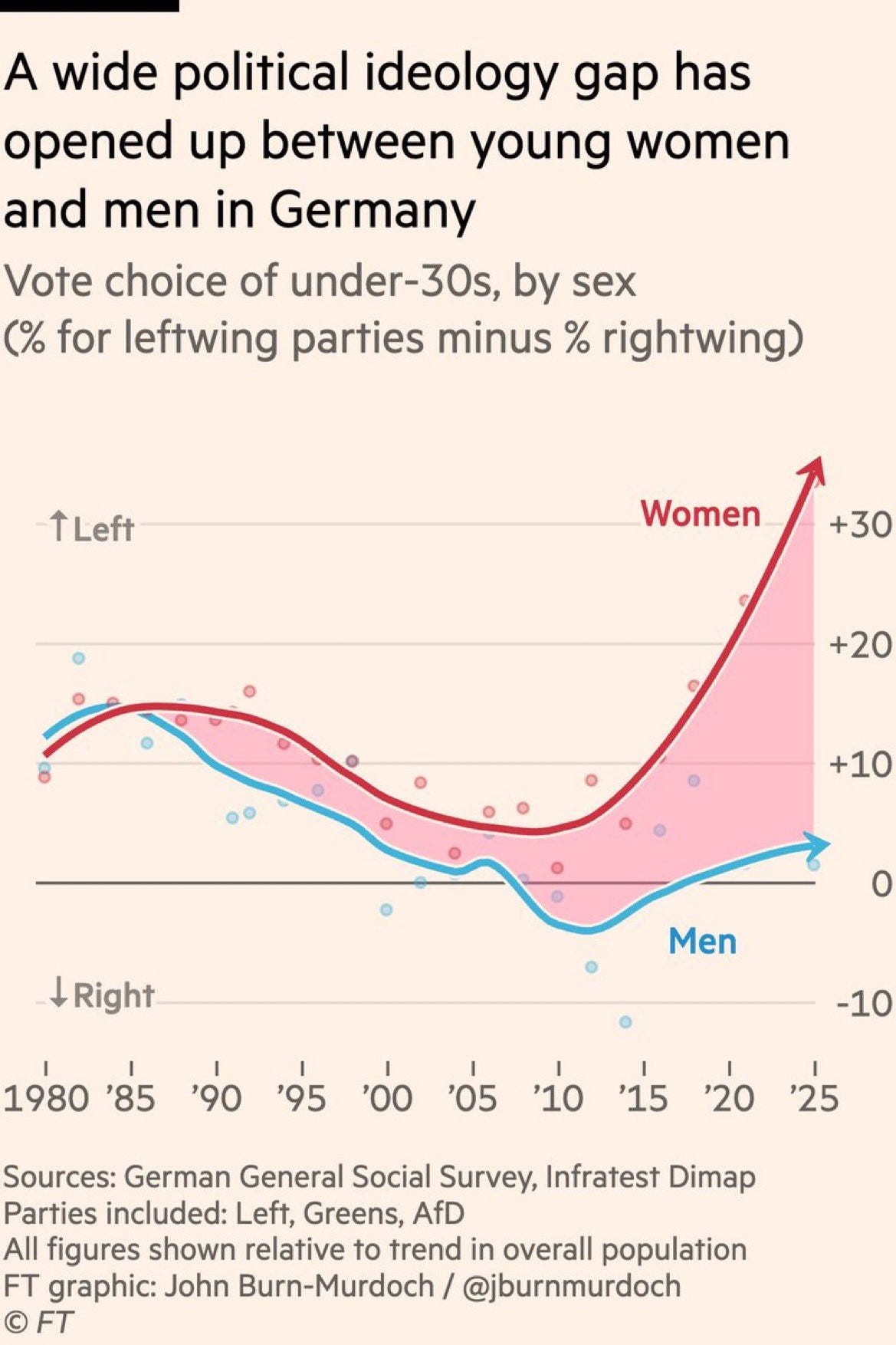Germany Elects To Stay The Course. Mostly.
It appears that observations of “something happening” in Germany were premature.

Despite a recent wave of violence perpetrated by immigrants of Third World origin, it had limited significant impact on the outcome of Germany’s latest federal election.
Here are the results:
The big story is that the Alternative for Germany (AfD) party, who received the much-publicized endorsement of Elon Musk, didn’t do as well as many on the Left feared they would and many of the Right had hoped. This, despite AfD being the only party that made immigration a top priority. In the parliamentary system, coalition-forming follows elections, and there’s no guarantee the other parties will make nice with AfD to create a governing coalition.
“Could Be Better, Could Be Worse.”
It appears that observations of “something happening” in Germany were premature. Is it all doom and gloom, though? After all, AfD did double its proportion of the vote from five years ago. Ian Bremmer, a publicly prominent geopolitical analyst, rather stupidly said that the election amounted to a resounding rejection of AfD’s mandate despite the gains, to say nothing of the fact it also appears this election was a clear repudiation of the ruling Social Democratic Party (SPD). Was it even realistic to expect a better result?
X account “ɖʀʊӄքǟ ӄʊռʟɛʏ” summed up the outcome by saying, “Could be better, could be worse.”
He went into a little more detail:
A 10% increase in vote share in the context of ‘Google 1930’s Germany’ Germany is not bad, could be worse. This is a 10% increase in 3 1/2 years since the previous election in Sept 2021 despite very entrenched political and cultural guardrails and low information boomer inertia
Martin Sellner further analyzed and contextualized the election results. Though he concedes that the results were somewhat disappointing, he underscores why expectations should always be tempered, even in a democracy:
The reason for the Union’s success is are the 70+ voters. They follow the old parties like lemmings. Unfortunately, a radical left-wing Antifa party is also leading among the youngest voters. This is partly the AfD’s own fault because it dissolved its own stable youth before the election.
Basically, the election was delivered by Germany’s oldest and youngest voters. The former overwhelmingly supported the dominant, center-right Union coalition, while a plurality of the latter supported the far-left Die Linke (The Left) party. Interestingly, the AfD came in a close-ish second among young voters, suggesting that Germany’s political future may come down to these two parties.
The key to contextualizing these election results is to understand the Germany psyche itself:
Other nations probably shake their heads at “only 20%”. There is something important to understand about the German psyche: When Germans have internalized an ideology, they remain loyal to it - until the total collapse. Problems lead in the first instance, paradoxically, to a stubborn hardening.
In other words, Germans tend to be very pro-establishment. In that sense, they’re quite the conservatives. They keep things exactly as they are past the sell-by date. It explains why Germany has proven so stable, but it also explains why the country is obstinately unresponsive to glaring problems, culminating in the various collapses throughout its history. Is Germany looking at yet another one in the near future?
Sellner concludes that while the results were dissatisfying, it did represent a major step forward for not only AfD, but towards Germany deciding just how much longer it wants to continue on its present course off the cliff. He expects AfD to rise in popularity, perhaps to as much as 30 percent, within the next five years. Meanwhile, the Union, which has proven so dominant for decades following World War II, will finally collapse, while the Left fragments and further radicalizes. By 2030 - that year keeps popping up, doesn’t it? - AfD will be in a position to bring about necessary changes in Germany.
Is Sellner being too optimistic? Perhaps, but I find his assessment to be directionally correct. Germany, like the U.S., is undergoing a political realignment and transformation brought about by the Fourth Turning. Just as the post-World War II political order is coming to an end for the U.S., the same is happening in Germany, Britain, and elsewhere throughout the West. The more we approach the late stage of the Fourth Turning, the more events will accelerate. I know it sounds cliché, but things are stable until they’re not. History proves it time and again.
Where I think Sellner is being too optimistic is that the Left remains a formidable force in Germany. As shown earlier, Die Linke was the choice of young voters. While today’s young voters will be four years older by the next German election, many may remain committed leftists, with other young voters not far behind. Germany is, both culturally and politically, one of the most leftist societies on the planet. This isn’t changing any time soon. Even if the Right were to become a major political force, the Left would undoubtedly stand firmly in its way.
Then there’s the gender imbalance. Well over a third of young women voted for Die Linke, with no other party coming anywhere near close. Comparatively, a quarter of young men voted for AfD:
This tracks with trends we’ve seen elsewhere throughout the West: young men shift right, young women shift left. This phenomenon exists in the U.S. as well, though to a much smaller degree. France is one European country where men and women generally vote in similar proportions for each parties.
The election outcome is consistent with what other studies have shown in the past:
What you should notice is something I’ve pointed out repeatedly: women have become radicalized. However, the discourse focuses entirely on the radicalization of young men, for which there exists very little evidence, beyond anecdotes. Even if young men are radicalized to the right, it’s happening much more gradually compared to women. Perhaps a day might come when young men do shift dramatically rightward, as so many fear, but it’s clearly going to be in part a reaction to women so dramatically shifting leftward.
The problem is that a political divergence between young men and women means that consensus politics is virtually impossible. Men and women need to cooperate, not compete with one another. Furthermore, by voting for Die Linke, young women aren’t just expressing satisfaction with the status quo: they want even more of it. Given the danger mass immigration poses to women, it’d make sense for them to vote for parties that say they plan on doing something about it. But if these election results are anything to go by, young German women either don’t feel that way or just don’t see it as a problematic enough issue to change their vote.
Unfortunately, this then means young men will need to compete with even greater numbers of young foreign men for jobs, relationships, and their lives, frankly. Men are just as victims of crime and violence at the hands of immigrants. Due to biological, evolutionary factors, males react differently to violent foreigners encroaching on their space than women do. It explains why young men are more concerned about mass immigration than young women.
This is where we run into Germany’s biggest problem. Young men are competing with two groups: young women and young immigrants, many of whom view Germany as a land to conquer and pillage. Obviously, if young German men and women were on the same page, they could at least present a united front against the invaders. Instead, we have young men completely isolated, while young women are all but collaborating with the invaders.
This dynamic has a whole host of negative downstream impacts, much of which I’ve discussed previously. One particularly notorious problem is the “incel” phenomenon, which seems especially acute in Germany.
This isn’t from a scientific study, but if incel forums are anything to go by, I’d say Germany is overdoing it, as usual:
The incel phenomenon is symptomatic of a society where the social contract between men and women has completely unraveled. Unfortunately, foreign men don’t recognize any such social contract, play by their own rules, and if that wasn’t bad enough, are encouraged by the German state to do so. German men cannot match the foreigner’s level of aggression, are suppressed by the state from doing so, and women have no defense against it all, so they do what they’re biologically primed to do: bargain.
Time Is Running Out
In fact, the biggest problem with Germany, along with Europe as a whole, is that it’s become too old and feminized. It possesses neither the ability (too old) nor the willingness (too feminized) to put up a fight. As the election results demonstrate, women are unwilling to totally upend the status quo, to experience any kind of discomfort, to deal with the problems of immigration and national identity. As such, this informal coalition of older Germans plus young women are trying to buy time, hoping that nothing bad happens to them while they’re around.
Unfortunately, once you’ve surrendered, your fate rests in the victor’s hands. What’s this say about Germany’s future? Is it also headed for civil war, like Britain? I think the outcome for Germany will be less dramatic, but equally tragic.
The aging and feminization of Germany, coupled with the German mentality to maintain the internalized ideology to the bitter end, points to much more of the same. Friedrich Merz, leader of the Union coalition, the biggest winners of the night, immediately about-faced, announcing that no changes to immigration would be made. This is as firm a proclamation that Germany intends to maintain course towards the proverbial cliff.
All the while, the population will further age, native birth rates will continue to decline, and the Left will become more radicalized, if not stronger, as the crisis intensifies in Germany. More disturbingly, the alliance between the Left and Muslims will strengthen, as evidenced by the outcome of the election.
Muslims provide “muscle” for the Left that even far-left groups like Antifa can’t offer. Strong in their faith, their identity, and sense of destiny, all things Germans lack, Muslims are poised to overwhelm Germany this century, which seems too long a timeline to be overly concerned about. In fact, if the election results are any indication, most Germans aren’t concerned about it at all, and seem instead to be more preoccupied with getting through this right-wing populist moment, which still has yet to kick into high gear, in my opinion.
The problem is, the country is quickly approaching the point of no return. Age-wise, it probably already has. The next shoe to drop is the extent to which Germany will continue to allow its own Great Replacement to occur. My gut sense is that it’s too far gone and that the German psyche doesn’t allow for course corrections to occur unless triggered by some intervening event like a collapse, so things will just keep going on, Third World migrants will continue terrorizing the population, other problems will mount until the prevailing political order collapses. Then, Germany will be left with either the AfD (assuming it hasn’t been dismantled by the state, as they’d like to do) or the Left-Islam coalition, and maybe the two sides will end up coming to blows over it. It’s a potential nightmare scenario, with no room for compromise, but as is the case throughout the West, Germany is in now in a state where a political solution is impossible. The post-1945 liberal consensus is much too entrenched, unwilling to relinquish power, and neither are most Germans in favor of doing so.
If a civil war or revolution happens in Germany, it’ll happen following the collapse of the status quo. Even then, it’ll likely be as one-sided as it is today, since the Germans lack the demographics to put up resistance. I could be wrong about all this, but I speculate based on trend-lines, not grand narratives of birth, death, and rebirth.
2030 serving as a pivotal year for the West as a whole, I think by then, we’ll have a clearer picture of where Germany is headed. At least I hope. The opposite could be true. All said, of the European heavyweights, I consider Germany to have the bleakest future, with the least amount of capacity for resistance. Unfortunately, where Germany goes, Europe as a whole will go.
Though this happened in Austria, I consider this picture emblematic of the crisis facing the West as a whole:
The grinning young Third World migrant had just stabbed a teenage Austrian boy. Confronting him is a female police officer, who has trained her entire career to deal with mostly law-abiding Europeans. Instead, she’s faced with a vicious savage, for whom Austrian culture, laws, and norms mean nothing. Civilized, enlightened Europe has become so disconnected from the feral realities of the world, that it has no answer to what’s clearly an invasion by a relentlessly hostile alien force.
Just a day after the election, this happened:
That’s a naked Gambian immigrant who obstructed traffic by playing in the street, going on to injure three police officers before being taken into custody. An incident does not make a trend. But it fits into a pattern everyone is aware exists, serving as a symbol of a once-great nation’s decline.
Whether they want to admit it or not, what Germans as a collective voted for is for more stabbings and more naked Gambians in the streets. They’ll have to find a way to live with that choice.
So Long, Farewell, Auf Wiedersehen, Goodbye?
If you haven’t caught it by now, I think Germany is finished as a both a political force and a society. For all the talk of its strength, history shows Germany to have a record of collapse and defeat. It appears to be ingrained in its DNA. There’s no reason to expect a dissimilar fate this time around. That said, there’s much to admire about Germany and its people, and there are those living there who are on my mind as I type this. I wish them well.
Germany aside, the more universal lesson, I believe, is that democracy rarely brings about dramatic results. This has less to do with democracy itself and more to do with people: we’re all conservatives, at heart, even the liberals. We prefer the familiar, we don’t like change, it’s just that some of us are more honest about it than others. When it comes to change, we prefer change on our terms, in accordance with our preferences.
Remember: if not for the Electoral College, Donald Trump would’ve been defeated by Hillary Clinton in 2016. It was the unique nature of America’s political system, along with a twist of fate, that changed the course of history forever. It’s not to say someone like Trump never would’ve come along, but it would’ve happened much, much later. Democracy is, ironically or not, not the change agent people want to believe it to be. There goes a saying: If voting made a difference, they wouldn’t let us do it.
So, don’t expect democracy to ever bring about revolutions. In some ways, this is why democracy exists: so the entirety of the system doesn’t need to be overthrown every single time people become dissatisfied with the status quo. Not only that, democracy is subject to “management,” subversion, and, as Plato observed over a millennia ago, leads to social breakdown and chaos, for which only tyranny can suffice.
I think Germany is proving old Plato correct.
Over to you: what is your reaction to the German federal elections? Is the country doomed? Is there any way for Germany to pull itself out of its morass that doesn’t involve drastic measures, which are unlikely to be taken under the prevailing political order?
Let’s discuss it in the comments section.
Max Remington writes about armed conflict and prepping. Follow him on Twitter at @AgentMax90.
If you liked this post from We're Not At the End, But You Can See It From Here, why not share? If you’re a first-time visitor, please consider subscribing!









Germany has two elections to go to select nationalism and a German governance. 8 years and I'm being optimistic. Screw the green crap and multikulti. Embrace your heritage and defend it.
I worked in Holland surrounded by Germans for several years. European politics are extremely narrow, especially Germany. "When Germans have internalized an ideology, they remain loyal to it - until the total collapse." -- a very accurate summary. And their conception of history makes everyday Europeans are allergic to anything even remotely nationalistic or right-wing. A Yankee comparison: for middle-class Germans, AfD is the KKK and Alice Weidel is David Duke in drag. And that's probably understates it slightly.
"Given the danger mass immigration poses to women, it’d make sense for them to vote for parties that say they plan on doing something about it."
We're seeing this everywhere: educated feminists trying to destroy the very civilization that makes feminist education possible. It's illogical, but they're all woke postmodernists and "logic is white supremacy". I just used Thomas Cole's Desecration of Empire in one of my articles recently -- https://tinyurl.com/33xm8b96 A breakdown of civilization is uniquely bad for women. Yet Western feminists will keep demanding deconstruction of their own civilization until they end up like that poor girl in the lower center (well, with torn jeans and pink hair and a dozen piercings instead of a white dress.)
Bottom line: Germany is lost. I say that from personal experience and from demography. Has Michel Houllebecq's Submission has been translated into German?
Finally, the political gender divide appears to be universal among industrialized countries at this point and bodes VERY ill for our long term survival. In 20 years, we may all be S. Korea.